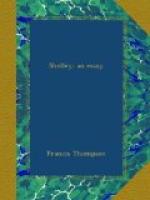* * * * *
It is this gift of not merely embodying but apprehending everything in figure which co-operates towards creating his rarest characteristics, so almost preternaturally developed in no other poet, namely, his well-known power to condense the most hydrogenic abstraction. Science can now educe threads of such exquisite tenuity that only the feet of the tiniest infant-spiders can ascend them; but up the filmiest insubstantiality Shelley runs with agile ease. To him, in truth, nothing is abstract. The dustiest abstractions
Start, and tremble under his feet,
And blossom in purple and red.
The coldest moon of an idea rises haloed through his vaporous imagination. The dimmest-sparked chip of a conception blazes and scintillates in the subtile oxygen of his mind. The most wrinkled AEson of an abstruseness leaps rosy out of his bubbling genius. In a more intensified signification than it is probable that Shakespeare dreamed of, Shelley gives to airy nothing a local habitation and a name. Here afresh he touches the Metaphysical School, whose very title was drawn from this habitual pursuit of abstractions, and who failed in that pursuit from the one cause omnipresent with them, because in all their poetic smithy they had left never a place for a forge. They laid their fancies chill on the anvil. Crashaw, indeed, partially anticipated Shelley’s success, and yet further did a later poet, so much further that we find it difficult to understand why a generation that worships Shelley should be reviving Gray, yet almost forget the name of Collins. The generality of readers, when they know him at all, usually know him by his Ode on the Passions. In this, despite its beauty, there is still a soupcon




